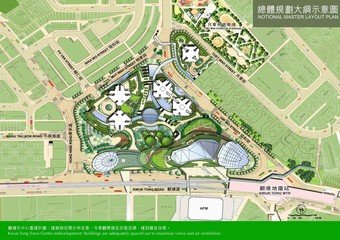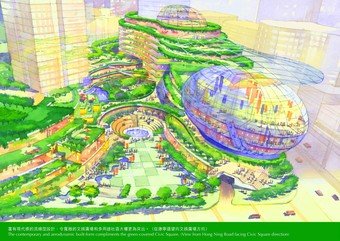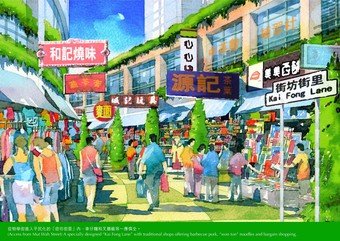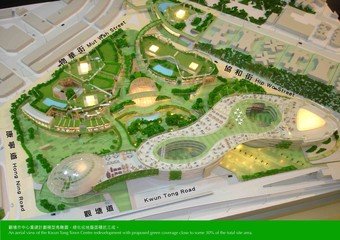Kwun Tong Town Centre project : People's Choice
The Urban Renewal Authority (URA) has submitted the development
scheme plans of the Kwun Tong Town Centre project to the Town
Planning Board (TPB), signifying commencement of the statutory
planning procedures for the mega project.
Major design features of the project are results of an extensive
consultation with the community, which include landmark features of
a modernistic design, increased open space and greening,
comprehensive community and commercial services as well as
community-friendly features such as street and bazaar in
traditional "kaifong-style".
URA Board member and Chairman of the URA Kwun Tong District
Advisory Committee (DAC), Professor David Lung, and the URA
Managing Director, Mr Billy Lam, outlined details of the
development scheme plans for the project at a press conference
today (Monday).
Professor Lung said: "Over the past two years, the URA has adopted
a proactive, bottom-up approach in its community engagement
initiatives involving extensively the local community and key
stakeholders in a participative planning and design process. Based
on public views collected in four rounds of public consultation
exercises, we have formulated the draft plans and final design
which have just been submitted to the TPB for consideration."
The extensive consultation included conducting constant dialogue
with concern groups, a community aspirations survey, community
focus groups, setting up the URA's Kwun Tong District Advisory
Committee, meetings with the Kwun Tong District Council, organising
a participatory community design workshop and holding a series of
roadshows that attracted some 85,400 visitors.
Occupying a total site area of 5.35 hectares, the Kwun Tong Town
Centre project is expected to deliver a total floor area of 400,000
square metres, comprising 210,000 square metres for commercial,
160,000 squares metres for residential and 32,000 square metres for
Government/Institution/Community purposes. Besides, there will be
8,700 square metres of meticulously landscaped and sculptured open
space for the enjoyment of the public. Mainstream public opinion
collected during the public consultations has been used as the
cornerstone of the final design.
Professor Lung said that the URA has heeded the views of the
residents and other stakeholders in the latest design effort. In
particular, 12 major features have been incorporated to reflect the
aspirations of the community. These include:
- diversified build-form and architecture for community,
commercial and residential purposes, ranging from modernistic and
landmark features to traditional kaifong-style street and
bazaar;
- a reasonable plot ratio commensurate with a town centre for the
600,000 population of Kwun Tong;
- appropriate building height to free up more public open space
on the ground;
- landmarks in the form of an oval-shaped multi-purpose civic
centre, an iconic commercial tower and a cone-shaped glass atrium
for the public transport interchange;
- a terraced -garden design with abundant water features;
- green coverage of almost 30 percent of the site area;
- enlarging the Yue Man Square Rest Garden by four times and
preservation of the old trees;
- an all-weather integrated public transport interchange
that enables the entire site to become car-free in the open
areas;
- using a building set-back design to widen the roads and
pedestrian paths, and offer better views for all buildings
surrounding the site;
- placing the commercial complex along Kwun Tong road as noise
barrier for residential blocks in the north;
- priority to be given to the reprovisioning of government
buildings; and
- a sophisticated network of footbridges and tunnels to enhance connectivity between the site and the surrounding.
Moreover, it is expected that air ventilation would be much
improved and noise pollution much reduced because of the
purpose-built new structures.
Professor Lung said: "With a total development cost of over $30
billion, Kwun Tong Town Centre is the most challenging development
ever undertaken by the URA. Despite the high financial risk
involved, URA has decided to press on with the community-friendly
design not only for the good of the local community but also a host
of socio-economic benefits for the wider community of Hong
Kong.
According to a survey by the University of Hong Kong commissioned
by the URA, Kwun Tong Town Centre project will bring about, on
average, an additional growth of 0.11 percent in the gross domestic
production each year throughout the 12-year redevelopment period or
a total of 1.32% growth by the year the project completed.
This is considered a rather significant contribution from one
single project.
"Moreover, about 3,308 job opportunities in construction,
surveying, finance, real estate and insurance will be created
during the redevelopment period, thereby reducing the unemployment
rate in Hong Kong during the same period by 0.09 %."
"In addition, some 17,314 new job vacancies will be created in
Kwun Tong upon completion of the project, because of the additional
provision of floor area in shopping mall, street shops, hotel and
office complex in the new development. This is almost five times
the number of jobs now available in the redevelopment area," he
added.
Mr Billy Lam said that the three design concepts announced in
August last year was based on a plot ratio of 7.98, which is in
full compliance with the Hong Kong Planning Standards and
Guidelines and requirements of Outline Zoning Plan.
"However, after considering carefully all views expressed by
various quarters of the community and a cautious assessment of the
financial risks which URA can cope with, we have decided to lower
the plot ratio to 7.5 including provision of all the community
facilities. This reduction represents the maximum level of
market risk that URA can take."
"We know we must give first priority to our social mission and
therefore must shoulder the financial risk that come with the $30
billion project. We take comfort in the fact that the project will
not only bring about sustainable improvement in Kwun Tong's social
fabric but, more importantly, substantial long-term benefits to
Hong Kong's economy," he added.
The URA will begin property acquisition and rehousing of tenants
after the TPB and the Chief Executive in Council have given the
approval for the development plans.
The TPB is expected to publish notice tomorrow (Tuesday), inviting
comments from the public to the TPB in the next three weeks on the
development scheme plan of the Kwun Tong Town Centre project. The
TPB would then consider whether it should gazette the development
scheme and commence the statutory two-month public consultation in
accordance with the Town Planning Ordinance. The development scheme
plans would be available at the following locations for public
inspection during normal office hours until the plan is considered
by the TPB:
(i) the Planning Enquiry Counter, 17/F., North Point Government
Offices, 333 Java Road, North Point, Hong Kong (Monday to Thursday
9:00 am to 5:30 pm and Friday 9:00 am to 6:00 pm)
(ii) the Planning Enquiry Counter, 14/F., Sha Tin Government
Offices, 1 Sheung Wo Che Road, Sha Tin (Monday to Thursday 9:00 am
to 5:30 pm and Friday 9:00 am to 6:00 pm)
(iii) the URA, 10/F., Low Block, Grand Millennium Plaza, 181
Queen's Road Central, Hong Kong (Monday to Friday 8:45 am to 6:00
pm)
(iv) the URA's Kwun Tong Office, G/F., 71 Hip Wo Street, Kwun
Tong, Kowloon (Monday to Friday 8:45am to 6:00 pm).
Within the redevelopment site, there are 24 buildings of over 40
years with 1,640 property interests, involving 2,300 households and
business operators.
Together with the Kwun Tong Town Centre project, the URA has
implemented 31 redevelopment projects since March 2002, including
eight in association with the Hong Kong Housing Society. The
total development cost for these 31 projects is estimated at about
$54 billion.
(END)




